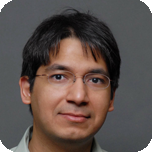Welcome New Members!
Lisa Coynes, Prashant Sharma, and Carmen Veloria have joined the Asian Studies Program recently. Each with a distinctive teaching record, scholarship, and passion in Asian Studies, these colleagues from different fields and backgrounds bring fresh perspectives and energy to the Program. Welcome!
Dr. Carmen N. Veloria is an Assistant Professor in the Sociology Department and Director of the Education Studies Program. Her research interests include urban sociology/education, inter-section of race, class, ethnicity, and gender, as well as the saliency of language, literacy, and culture. She is interested in the increasing ethnic and linguistic diversity that exist in urban centers and the notion of hybrid, mixed, and multiple identities, as well as biculturalism. These social constructs converge and intersect in ways that are complex, and poses challenges to existing racial/ethnic categories. From a personal standpoint, her children identify as both Asian/Latin@ – Latin@/Asian.

As a faculty at a multicultural institution like Suffolk University, Dr. Prashant Sharma seeks opportunities to know more about modern Asian culture. The growing influence of Asia in science and technology and the rapid cultural change that Asia is undergoing, are creating increasing number of employment opportunities many of which are relevant for our graduates. This makes it of utmost importance that we stay in tune with this cultural revolution so that we can meaningfully participate in the growth of this economic powerhouse.
Dr. Lisa Coyne’s purpose in the Clinical Psychology Doctoral Program at Suffolk, stated very simply, is to train Suffolk students to conduct sound research, and to provide the best, culturally sensitive, sustainable mental health services she possibly can. “I understand, both through the scientific literature and through my interactions with Asian families that there is a fine balance between negotiating one’s newly chosen culture, and retaining one’s own cultural identity. Thus, it is critical to ensure that mental health services are sensitive to that need for balance, and important to be able to describe and disseminate effective ways of doing so.”

